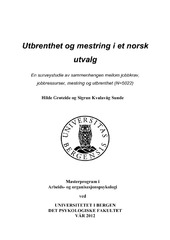| dc.contributor.author | Grøteide, Hilde | |
| dc.contributor.author | Sunde, Sigrun Kvalavåg | |
| dc.date.accessioned | 2013-03-22T14:20:30Z | |
| dc.date.available | 2013-03-22T14:20:30Z | |
| dc.date.issued | 2012-05-14 | eng |
| dc.date.submitted | 2012-05-14 | eng |
| dc.identifier.uri | https://hdl.handle.net/1956/6454 | |
| dc.description.abstract | The aim of this master thesis is to investigate the relationships between job demands (time pressure), job resources (autonomy), coping and burnout. A particular emphasis in this thesis is whether coping strategies moderate the relationship between job demands, job resources, and burnout. A total of 5022 respondents from eight different occupational groups participated in the study, and a response rate of 62,8 % was achieved. Five hypotheses were explored. Hypothesis 1 postulated a direct positive relationship between job demands (time pressure) and the burnout dimensions; exhaustion, cynicism and redused professional efficacy. Hypothesis 2 assumed a direct negative relationship between job resources (autonomy) and the three burnout dimensions. Further, hypothesis 3 suggested a direct positive relationship between negative coping and the burnout dimensions, and a direct negative relationship between positive coping and the burnout dimensions. In addition to the hypotheses considering direct effects, hypotheses concerning moderation effects have been postulated. Hypothesis 4 assumed that coping strategies moderate the relationship between time pressure and the three burnout dimentions, while hypothesis 5 suggested that coping strategies moderate the relationship between autonomy and the burnout dimentions. The results of the present study supports the assumed direct effects between time pressure, autonomy and coping strategies on burnout (hypothesis 1-3). Further, support was found for the moderation effect of positive passive coping on the association between time pressure and burnout (hypothesis 4b), but the effect was small. The results did not support the remaining moderation hypotheses 4a, 5a and b. The findings of this master thesis indicate that job demands and negative coping are associated with an increase in burnout, while job resources and positive coping are associated with a decrease in burnout. The results support that both individual factors as coping strategies and organizational factors as time pressure and autonomy play an important role in the burnout process. Methodological strengths and weaknessess, implications for theory and practice, and future research are discussed. | en_US |
| dc.description.abstract | Formålet med denne masteroppgaven er å undersøke sammenhengene mellom jobbkrav (tidspress), jobbressurser (autonomi), mestring og utbrenthet. En særlig vektlegging i oppgaven er hvorvidt mestringsstrategier modererer forholdet mellom jobbkrav, jobbressurser og utbrenthet. Totalt 5022 respondenter fra åtte ulike yrkesgrupper deltok i undersøkelsen, svarprosenten var 62,8 %. Fem hypoteser ble undersøkt. Hypotese 1 postulerte en direkte positiv sammenheng mellom jobbkrav (tidspress) og utbrenthetsdimensjonene utmattelse, kynisme og redusert opplevelse av egen profesjonell yteevne. Hypotese 2 antok en direkte negativ sammenheng mellom jobbressurser (autonomi) og de tre utbrenthetsdimensjonene. Videre foreslo hypotese 3 en direkte positiv sammenheng mellom negativ mestring og utbrenthetsdimensjonene, samt en direkte negativ sammenheng mellom positiv mestring og utbrenthetsdimensjonene. I tillegg til hypoteser om direkteeffekt er det også postulert hypoteser knyttet til moderatoreffekt. Hypotese 4 antar at mestringsstrategier modererer sammenhengen mellom jobbkrav og utbrenthetsdimensjonene, mens hypotese 5 foreslår at mestringsstrategier modererer relasjonen mellom jobbressurser og utbrenthetsdimensjonene. Resultatene gav støtte for de antatte direkteeffektene av jobbkrav, jobbressurser og mestringsstrategier på utbrenthet (hypotese 1-3). Videre ble det funnet støtte for hypotese 4b, ved at positiv passiv mestring modererer sammenhengen mellom tidspress og utbrenthet, men denne moderatoreffekten var svært liten. Det ble ikke funnet støtte for de videre hypotesene knyttet moderatoreffekt (hypotese 4a, 5a og b). Funnene fra foreliggende studie indikerer at jobbkrav og negativ mestring bidrar til økt utbrenthet, mens jobbressurser og positiv mestring bidrar til å motvirke utbrenthet. Resultatene gir støtte til at både individfaktorer som mestringsstrategier og organisasjonsfaktorer som tidspress og autonomi spiller en rolle i utbrenthetsprosessen. Metodiske styrker og svakheter, implikasjoner for teori og praksis, samt fremtidig forskning blir diskutert. | en_US |
| dc.format.extent | 2191396 bytes | eng |
| dc.format.mimetype | application/pdf | eng |
| dc.language.iso | nob | eng |
| dc.publisher | The University of Bergen | eng |
| dc.subject | Utbrenthet | eng |
| dc.subject | Mestring | eng |
| dc.subject | Jobbkrav | eng |
| dc.subject | Jobbressurser | eng |
| dc.subject | Tidspress | eng |
| dc.subject | Autonomi | eng |
| dc.subject | Burnout | eng |
| dc.subject | Coping | eng |
| dc.subject | Job demands | eng |
| dc.subject | Job resources | eng |
| dc.subject | Time pressure | eng |
| dc.subject | Autonomy | eng |
| dc.title | Utbrenthet og mestring i et norsk utvalg. En surveystudie av sammenhengen mellom jobbkrav, jobbressurser, mestring og utbrenthet (N=5022) | eng |
| dc.type | Master thesis | |
| dc.rights.holder | Copyright the author. All rights reserved | |
| dc.description.degree | Master i Arbeids- og organisasjonspsykologi | |
| dc.description.localcode | PSYK350 | |
| dc.description.localcode | MAPS-AOP | |
| dc.subject.nus | 736999 | eng |
| fs.subjectcode | PSYK350 | |
